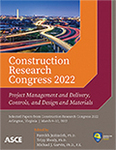Identifying Multilevel Metrics for Construction Competency and Performance Measures
Publication: Construction Research Congress 2022
ABSTRACT
Construction competencies are combinations of skills, knowledge, technologies, other resources, and practices of a construction organization that contribute to increased effectiveness, competitiveness, profitability, and performance. Previous studies have developed mechanisms to identify and develop construction competencies that aid in performance measurement at project and organization levels, separately. In reality, construction organizations are project-based organizations with complex interactions between competencies influencing performance at different levels. The challenges associated with multilevel construction competency measures include identifying the interrelationship between competencies at different levels and relating multilevel competencies to multilevel performance measures. To address these challenges, this paper provides a review of the literature related to multilevel construction competency frameworks and performance measurement methods. Based on an analysis of the literature, a multilevel framework is developed and presented for construction competency and performance measures. Finally, a data collection approach is provided that will assist researchers and industry practitioners in evaluating construction competencies and performance.
Get full access to this article
View all available purchase options and get full access to this chapter.
REFERENCES
Barbosa, F., Woetzel, J., Mischke, J., Ribeirinho, M. J., Sridhar, M., Parsons, M., Bertram, N., and Brown, S. (2017). “Reinventing Construction: A Route to Higher Productivity.” www.mckinsey.com/mgi.
Barlas, Y. (1996). “Formal Aspects of Model Validity and Validation in System Dynamics.” Syst. Dyn. Rev., 12(3), https://doi.org/10.1002/(sici)1099-1727(199623)12:3%3C183::aid-sdr103%3E3.0.co;2-4.
Campion, M. A., Fink, A. A., Ruggeberg, B. J., Carr, L., Phillips, G. M., and Odman, R. B. (2011). “Doing Competencies Well: Best Practices in Competency Modeling.” Pers. Psych., 64(1), https://doi.org/10.1111/j.1744-6570.2010.01207.x.
Cheng, E. W., Li, H., and Fox, P. (2007). “Job Performance Dimensions for Improving Final Project Outcomes.” J. Constr. Eng. Manag., 133(8), https://doi.org/10.1061/(asce)0733-9364(2007)133:8(592).
Dainty, A. R. J., Cheng, M. I., and Moore, D. R. (2004). “A Competency-based Performance Model for Construction Project Managers.” Constr. Manag. Econ., 22(8), https://doi.org/10.1080/0144619042000202726.
Eken, G., Bilgin, G., Dikmen, I., and Birgonul, M. T. (2020). “A Lessons-learned Tool for Organizational Learning in Construction.” Autom. Constr., 110, https://doi.org/10.1016/j.autcon.2019.102977.
Frame, J. D. (1999). Project Management Competence: Building Key Skills for Individuals, Teams, and Organizations. Jossey-Bass: San Francisco, CA.
Hanna, A. S., Ibrahim, M. W., Lotfallah, W., Iskandar, K. A., and Russell, J. S. (2016). “Modeling Project Manager Competency: An Integrated Mathematical Approach.” J. Constr. Eng. Manag., 142(8), 04016029, https://doi.org/10.1061/(asce)co.1943-7862.0001141.
Hobday, M. (2000). “The Project-based Organisation: An Ideal Form for Managing Complex Products and Systems?” Res. Policy, 29(7–8), https://doi.org/10.1016/s0048-7333(00)00110-4.
IEEE. (1990). IEEE Standard Glossary of Software Engineering Terminology. In IEEE Std 610.12-1990, pp.1–84, https://doi.org/10.1109/IEEESTD.1990.101064.
IPMA. (2006). IPMA Competence Baseline (ICB),. International Project Management Association: Nijkerk, Netherlands.
Krajcovicova, K., Caganova, D., and Cambal, M. (2012). “Key Managerial Competencies and Competency Models in Industrial Enterprises.” 23rd DAAAM International Symposium on Intelligent Manufacturing and Automation 2012, 2.
Loufrani-Fedida, S., and Missonier, S. (2015). “The Project Manager Cannot Be a Hero Anymore! Understanding Critical Competencies in Project-based Organizations from a Multilevel Approach.” Int. J. Proj. Manag., 33(6), 1220–1235, https://doi.org/10.1016/j.ijproman.2015.02.010.
Loufrani-Fedida, S., and Saglietto, L. (2016). “Mechanisms for Managing Competencies in Project-based Organizations: An Integrative Multilevel Analysis.” Long Range Plann., 49(1), 72–89, https://doi.org/10.1016/j.lrp.2014.09.001.
Omar, M. N. (2015). A Fuzzy Hybrid Intelligent Model for Project Competencies and Performance Evaluation and Prediction in the Construction Industry (Doctoral dissertation). https://doi.org/10.7939/R3TB0Z59X.
Omar, M. N., and Fayek, A. R. (2016). “Modeling and Evaluating Construction Project Competencies and Their Relationship to Project Performance.” Autom. Constr., 69, 115–130, https://doi.org/10.1016/j.autcon.2016.05.021.
PMI (Project Management Institute). (2017). Project Manager Competency Development (PMCD) Framework. Project Management Institute: Newton Square, PA.
Poveda, C. A., and Fayek, A. R. (2009). “Predicting and Evaluating Construction Trades Foremen Performance: Fuzzy Logic Approach.” J. Constr. Eng. Manag., 135(9), https://doi.org/10.1061/(asce)co.1943-7862.0000061.
Rezk, S., Whited, G. C., Ibrahim, M., and Hanna, A. S. (2019). “Competency Assessment for State Highway Agency Project Managers.” Transp. Res. Rec., 2673(3), 658–666, https://doi.org/10.1177/0361198119832870.
Tiruneh, G. G., and Fayek, A. R. (2018). “A Framework for Modeling Construction Organizational Competencies and Performance.” Construction Research Congress 2018, 712–722.
Tiruneh, G. G., and Fayek, A. R. (2019). “Feature Selection for Construction Organizational Competencies Impacting Performance.” 2019 IEEE International Conference on Fuzzy Systems (FUZZ-IEEE), 1–5, https://doi.org/10.1109/FUZZ-IEEE.2019.8858820.
Vukomanović, M., Young, M., and Huynink, S. (2016). “IPMA ICB 4.0 — A Global Standard for Project, Programme and Portfolio Management Competences.” Int. J. Proj. Manag., 34(8), https://doi.org/10.1016/j.ijproman.2016.09.011.
Information & Authors
Information
Published In
History
Published online: Mar 7, 2022
Authors
Metrics & Citations
Metrics
Citations
Download citation
If you have the appropriate software installed, you can download article citation data to the citation manager of your choice. Simply select your manager software from the list below and click Download.
